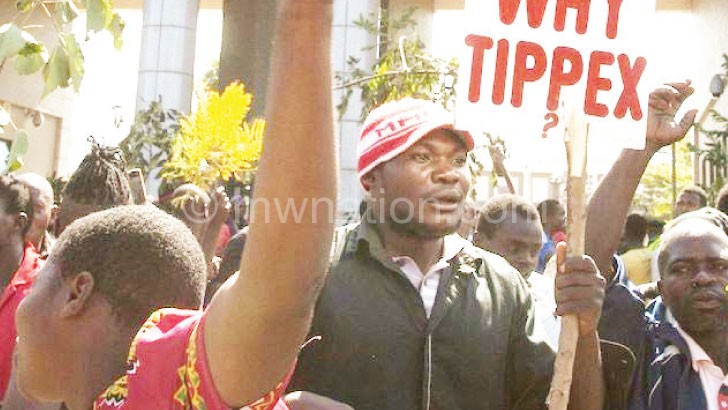Campaigners celebrate victory
Civil society activists and opposition supporters are celebrating after the Constitutional Court in Lilongwe on Monday invalidated the May 2019 elections and ordered a rerun within 150 days.
Celebrating the outcome, UTM Party quoted Nelson Mandela, saying: “It is better to lead from behind and to put others in front, especially when you celebrate victory when nice things occur.
“You take the front line when there is danger. Then people will appreciate your leadership.”
Malawians held their breath as it took the court 10 hours to deliver a summary of the verdict.

Had the ruling gone the other way, long-running protests would probably have intensified.
Justice Healy Potani agreed with the petitioners from the opposition who argued that the vote had been fraudulent.
“Our finding is that the anomalies and irregularities have been so widespread, systematic and grave such that the integrity of the result was seriously compromised, and can’t be trusted as the will of voters of the May 2019 21 election,” he said, adding that Malawi Electoral Commission (MEC) had failed to organise the elections in line with the Constitution.
Lawyers for Malawi Congress Party (MCP) presidential hopeful Lazarus Chakwera, who petitioned the court alongside UTM leader Saulos Chilima, argued in court that Tipp-Ex had been used to alter results on some tallying.
The incumbent, President Peter Mutharika, who was accused of having been complicit in the vote-rigging, was declared the narrow winner with 38 percent of the vote.
Chakwera and Chilima claimed the irregularities had affected more than 1.4 million of the 5.1 million votes.
The court ordered a return of the government to the way it was before the nullified polls.
This means Mutharika will remain President for now while Chilima will revert to the vice-presidency.
The Human Rights Defenders Coalition (HRDC), which held regular protests against electoral fraud, said they have managed to prove skeptics wrong.
“The theory that says united we stand divided we fall [is vindicated]. As for us Malawians, we remain united. #PowerToPeople,” it tweeted soon after the verdict.
Malawi has become the second African country in the past decade to have its elections overturned by a court, the first being Kenya’s 2017 poll which elected President Uhuru Kenyatta.
Both elections have former South Africa president Thabo Mbeki as a common denominator. He chaired the African Union Observation Mission to Kenya and the Commonwealth team to Malawi.
Zimbabwean President Emerson Mnangagwa—chairperson of the Southern African Community (Sadc) Organ on Politics, Defence and Security—said in a statement on Tuesday: “Sadc commends the Constitutional Court for upholding the Malawian Constitution, and the electoral law in the conduct of the petition.”
Mnangagwa himself faced massive protests after Zimbabwe’s 2018 elections.
He said Sadc would continue to support Malawi in its election process.
Mnangagwa urged all concerned to respect the landmark judgement “and maintain peace and tranquility, whilst the relevant national institutions prepare for fresh elections”.
The Sadc observer mission noted that the elections were conducted in a peaceful atmosphere and urged those who were dissatisfied with the outcome to go to court to settle any disputes.
Grant Masterson from the Electoral Institute for Sustainable Democracy in Africa said the judgeent would have far-reaching consequences on the continent.
Masterson, who travelled to observe both the Kenyan and Malawian elections, said the annulling of elections using judicial reviews would encourage voters elsewhere “to pursue legal action with an elevated expectation of success”.
He said the immediate way forward for Malawi—with parliament having to sit to facilitate the legal mechanisms to hold fresh elections—could be difficult.
“Based on Kenya’s experience, it is going to be a massive challenge to organise fresh elections, which typically take years of preparation. The possibility of heightened tensions remains,” he said.
“The role of the army will be crucial as we have seen the army protecting civilian demonstrators in the build-up to this decision. However, the armed forces remain central to prospects for a peaceful re-run.”
Masterson said courts were now prepared to demand higher standards than previously, to satisfy themselves that election results were credible.
He stated: “Both Kenya and Malawi’s judgements have demanded better from their election management body and State institutions.”
Elections were, however, expensive and disruptive, and Kenya’s second attempt at elections was possibly weaker than the first. “Kenya’s rerun saw a boycott by major political formations which undermined the atmosphere in which the repeated elections were held.”
Arnold Tsunga, Africa director of the International Commission of Jurists, was critical of Mbeki and international observer missions.
He said the use of former statesmen as leaders of observer missions was creating the impression that they were an “elite pact” to protect incumbents.
International observers had become “rubber stamps of deeply flawed elections,” he said.
“There is a need to invest in observing the entire electoral circle,” he said, rather than just a few weeks of it, adding that international observers needed a “thorough briefing on local law and processes”.
Major shake-ups are expected in Malawi in the next five months.





